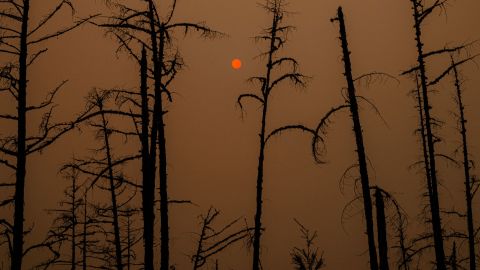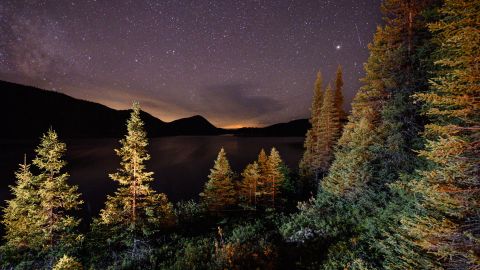The world’s most northerly forests could be a “time bomb” of planet-warming pollution as expanding wildfires have released record high levels of planet-heating pollution into the atmosphere, according to a new study.
Using new satellite data analysis techniques, researchers found that, since 2000, summer wildfires have expanded in boreal forests, which wrap around the northernmost parts of the Earth.
Boreal forest fires usually make up 10% of global wildfire-related carbon pollution. But in 2021, their contribution soared to 23%, according to the study, as extreme drought and heatwaves in Siberia and Canada helped drive intense fires.
“Boreal forests could be a time bomb of carbon, and the recent increases in wildfire emissions we see make me worry the clock is ticking,” said study author Steven Davis, a professor of earth system science at the University of California at Irvine, in a press release.

These forests, which cover huge swaths of Canada, Russia and Alaska, are the world’s largest land biome. They are also carbon dense, releasing 10 to 20 times more planet-heating carbon pollution for each unit of area burned by wildfires than other ecosystems, according to the study.
Boreal forests are one of the fastest warming biomes on Earth, and warmer and drier fire seasons are contributing to expanding wildfires.
Russia’s Siberian region experienced particularly bad wildfires in 2021 which burned nearly 45 million acres (18.16 million hectares) of Russian forest in 2021.
In July that year, reconnaissance pilot Svyatoslav Kolesov told CNN he couldn’t fly his plane in the far eastern Russian region of Yukutia because smoke from the fires was so thick.
The region is prone to wildfires and much of the land is covered in forests, but Kolesov said something has changed.
“New fires have appeared in the north of Yakutia, in places where there were no fires last year and where it had not burned at all before,” he said.

Wildfires are becoming larger and more intense and they are also happening in places that aren’t used to such extreme fires. The situation is likely to worsen as temperatures rise, study author Bo Zheng, an assistant professor at Tsinghua University in Beijing, told CNN via email.
Higher temperatures encourage the growth of vegetation, which then becomes exceptionally dry during heatwaves, increasing the risk of wildfires.
“We are facing dangerous positive feedback between climate and boreal fires,” Zheng said.
“Heatwaves and droughts are likely to occur more frequently over the boreal region, and the frequency and intensity of extreme wildfires like those in 2021 are likely to increase, with the release of CO2 emissions in turn leading to further global warming,” he added.

Jeff Wells, the vice president for boreal conservation at the conservation organization National Audubon Society, who was not involved in the study, told CNN that he was not surprised that the study had found such a high level of carbon pollution from boreal fires. But, he said, “the size of the spike in 2021 is shocking.”
The findings are “yet another stark warning” of the need to “drastically reduce CO2 emissions,” Wells said.
Wells also pointed to the role Indigenous communities play in protecting forests and peatlands.
“It is time the world recognizes the leadership and knowledge of Indigenous peoples and their governments in the boreal and across the world in stewarding their traditional territories, especially in the face of the increase in the size and frequency of wildfires,” said Wells.
https://news.google.com/rss/articles/CBMiWmh0dHBzOi8vd3d3LmNubi5jb20vMjAyMy8wMy8wMi93b3JsZC9ib3JlYWwtZm9yZXN0LWZpcmVzLXN0dWR5LWNsaW1hdGUtc2NuLWludGwvaW5kZXguaHRtbNIBXmh0dHBzOi8vYW1wLmNubi5jb20vY25uLzIwMjMvMDMvMDIvd29ybGQvYm9yZWFsLWZvcmVzdC1maXJlcy1zdHVkeS1jbGltYXRlLXNjbi1pbnRsL2luZGV4Lmh0bWw?oc=5
2023-03-02 19:00:00Z
CBMiWmh0dHBzOi8vd3d3LmNubi5jb20vMjAyMy8wMy8wMi93b3JsZC9ib3JlYWwtZm9yZXN0LWZpcmVzLXN0dWR5LWNsaW1hdGUtc2NuLWludGwvaW5kZXguaHRtbNIBXmh0dHBzOi8vYW1wLmNubi5jb20vY25uLzIwMjMvMDMvMDIvd29ybGQvYm9yZWFsLWZvcmVzdC1maXJlcy1zdHVkeS1jbGltYXRlLXNjbi1pbnRsL2luZGV4Lmh0bWw
Bagikan Berita Ini
















0 Response to "Boreal forests could be a planet-warming 'time bomb' as wildfires expand, says new study - CNN"
Post a Comment